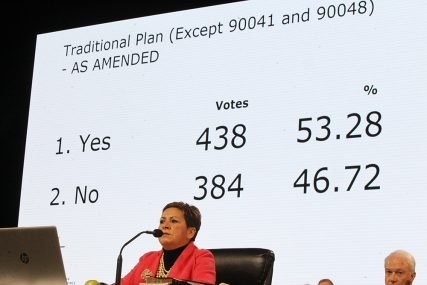United Methodists Would’ve Met This Week to Consider a Split. What Are They Doing Instead?

Were 2020 going as planned, United Methodists from around the world would be wrapping up a two-week meeting in Minneapolis, where they were expected to discuss a measure to split the denomination.
But, as it is, the coronavirus pandemic has forced people into their homes, closed businesses and canceled events well into the summer.
The quadrennial United Methodist General Conference has been postponed until next year — possibly until late August and early September 2021.
Many U.S. United Methodist leaders see the delay as a blessing, allowing more time and cooler heads to consider a split. But some have also expressed concern over continuing harm to many in the denomination eager to move on after decades of debate over the role of LGBTQ Christians in the church.
Delegates to the General Conference were expected to take up a proposal to split the denomination, called “A Protocol of Reconciliation and Grace Through Separation.” The proposal, negotiated by 16 United Methodist bishops and advocacy group leaders from across theological divides, would commit $25 million to create a new conservative “traditionalist” Methodist denomination.
Calls to split one of the largest denominations in the United States have grown since last year’s special session of the United Methodist General Conference approved the so-called Traditional Plan strengthening its bans on the ordination and marriage of LGBTQ United Methodists.
The protocol wasn’t the only thing on the agenda for the global meeting, where delegates also take up important matters such as setting the denomination’s budget for the next four years.
A team of United Methodist leaders has been discussing the implications of the unprecedented postponement, including how people continue to serve in different boards and agencies and how things are budgeted, Carter said. The group that negotiated the proposed protocol, which includes the bishop, met once in March after the postponement was announced to check in with one another, as well, he said.
“I think in the same way work is going to be profoundly changed, I think how we meet will be as well,” he said.
The bishop said he hopes that will include the ability to conduct some denominational business virtually, though, he admitted, that would require some changes to its polity.
But, Carter said, “the delay of the General Conference did not happen in a vacuum.”
The decision came with much consideration of how to care for congregations and those most vulnerable to the coronavirus — how to care for “the anxiety, the trauma, the suffering, the grief” of the moment.
The Council of Bishops has suggested rescheduling the meeting for Aug. 31 to Sept. 10, 2021, at the Minneapolis Convention Center.
The Commission on General Conference has not yet confirmed dates for the meeting in 2021. A group of young delegates has circulated a petition asking them to reconsider the bishops’ suggestion, as those dates conflict with the start of the academic year.
The Rev. Keith Boyette — president of the Wesleyan Covenant Association, which supports the protocol and plans to join the new traditionalist Methodist denomination if it passes — said his constituency runs the gamut of feelings about the postponement.
The delay in the meeting is also “hope delayed and deferred” for many who have been imagining the possibilities on the other side of the protocol, said Boyette, who was part of the protocol negotiations. If the General Conference was concluding Friday (May 15) as planned, he said, they could be moving into the “implementation phase” of the protocol.
They have concerns, too, he said, that unresolved conflict might keep the church from being as effective as it could be in this season and delay many ministries the denomination feels called to do.
“But,” Boyette said, “most people have become very realistic and see this as a season where the plans that we’re committed to continue to be perfected, that there’s additional time for churches and individuals to become better informed and to make informed decisions.”
In the meantime, the Wesleyan Covenant Association continues to prepare for the launch of a traditionalist denomination and develop a draft Book of Doctrines and Discipline.
It has also created a video series for clergy on doing ministry during a pandemic and is encouraging its members to support the United Methodist Committee on Relief’s COVID-19 Response Fund.
“We’re certainly not encouraging people to ignore what is happening presently and defer response so they can focus on something in the future,” Boyette said.



